Have you ever looked into the eyes of a lion walking around in its zoo area? Have you ever watched monkeys play in a big jungle gym? These things make you think, are zoos good places for animals or are they like prisons? Should zoos be banned? This question has been talked about for a long time, and people have strong opinions on both sides.
Zoos, as we know them, started as royal menageries. Royal menageries were collections of exotic animals meant to show off wealth and power. Over time, zoos changed. They said they would focus on education, protecting animals, and making sure the animals are well taken care of. But, these goals are often forgotten because people want to make money and have fun. This raises worries about how well animals are treated. It also raises questions about what zoos are really for.
Some critics say that zoos are not worth the ethical concerns of keeping animals in captivity. This article will look at the arguments for and against zoos. We will explore how keeping animals in zoos affects their well-being. We will also examine how effective conservation programs are. Finally, we will look at what educational value zoos provide. By the end, you will have a better understanding of this complex issue. You will also be able to form your own opinion.
Should Zoos Be Banned? The Ethics Debate
Zoos are popular places to visit and learn about animals. There is a growing debate about whether it is right to keep animals in zoos. We will explore both sides of this debate, the reasons for banning zoos and the reasons for keeping them open.
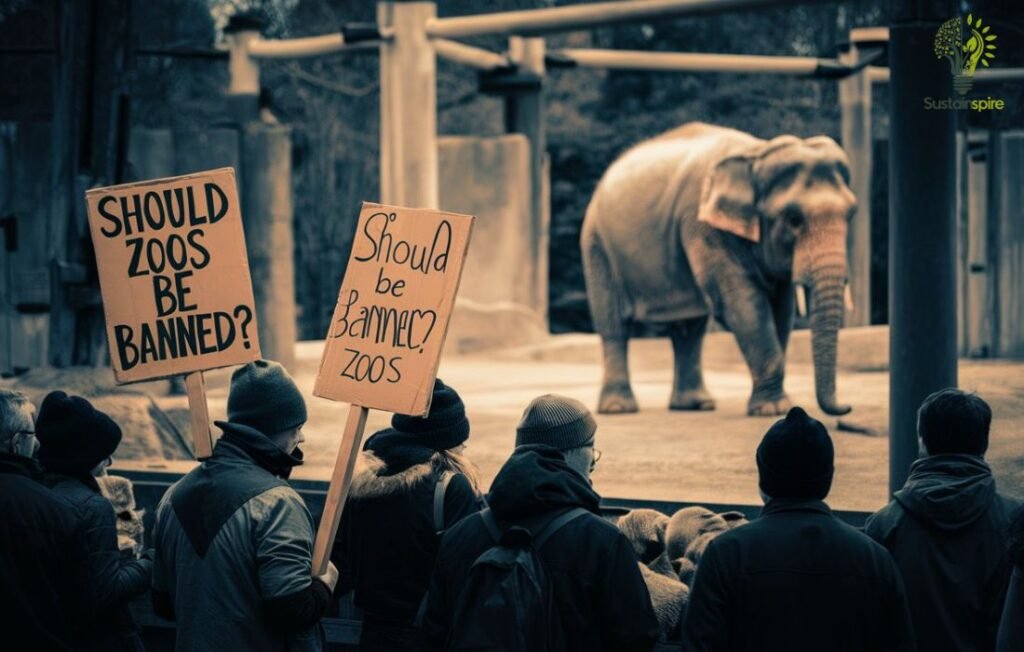
Should Zoos Be Banned? Why Some People Believe They Should Be?
Some people believe that keeping animals in zoos is wrong, no matter what. They argue that animals deserve to live in their natural habitats. Let’s learn about why they think this way.
1. Animal Welfare:
Animal welfare is a major concern for people who want to ban zoos. These people argue that zoos cannot create environments that are truly like the animals’ natural habitats. Imagine living your whole life in just one room. That is what it can feel like for some animals in zoos. This can cause animals to feel stressed, bored, and even mentally unwell. For example, big cats like lions often walk back and forth in their enclosures, which shows they are stressed and bored. Should zoos be banned? The question is a complex one, with many arguments on both sides.

2. The Problem with Captivity:
Animals in the wild have freedom. They choose mates, raise their young, and roam freely. However, animals in captivity have limited choices. They cannot escape danger, find food, or interact with a variety of species. Critics argue that this lack of freedom takes away natural instincts and behaviors. Imagine a bird that can’t fly or a wolf that can’t hunt – it is not natural. Should zoos be banned? This raises serious concerns about the ethics of keeping animals in captivity.

3. Conservation Concerns: Do Zoos Really Help?
Zoos often argue that they help with conservation. They say they educate the public and protect endangered species. They even reintroduce captive-bred animals into the wild. While these are noble goals, some critics argue that zoos are not as effective at conservation as they claim to be. They point out that only a small percentage of zoo animals are actually endangered. Even then, reintroduction programs can be very difficult and expensive. Furthermore, some argue that zoos actually contribute to the exploitation of animals. They say zoos take animals from the wild and use them for profit. They say zoos should be banned because they take animals from the wild and use them for profit.
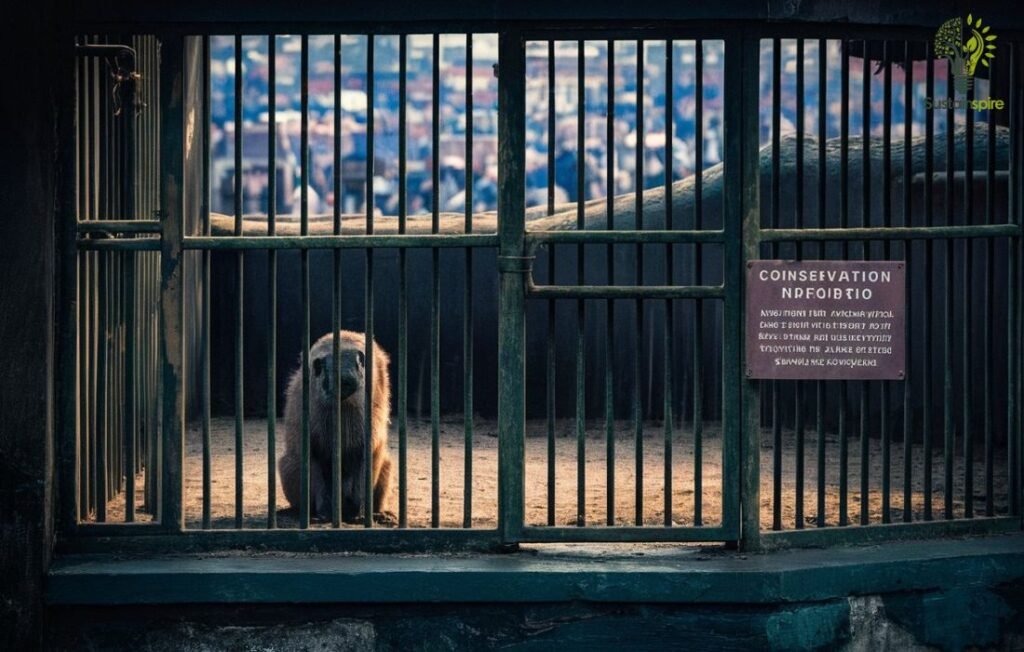
The Argument Against Banning Zoos:
Some people have valid concerns about animal welfare in zoos. However, there are strong arguments that suggest well-managed zoos provide significant benefits. The supporters say the idea of Should Zoos Be Banned is too extreme. Zoos play a crucial role in education, conservation, and research. They help improve the well-being of animals both in their care and in the wild.
1. Education and Awareness:
Zoos provide a unique opportunity for people to connect with wildlife. Seeing animals up close, rather than just in pictures or videos, creates a more impactful experience. This interaction fosters a sense of wonder and appreciation for the natural world. This inspires people to care about conservation. This educational role directly addresses the concerns behind the question of Should Zoos Be Banned. Many zoos also offer educational programs. These programs teach visitors about animal behavior and habitats. They also help them to learn about the importance of protecting endangered species. This knowledge empowers individuals to make informed decisions about conservation efforts.
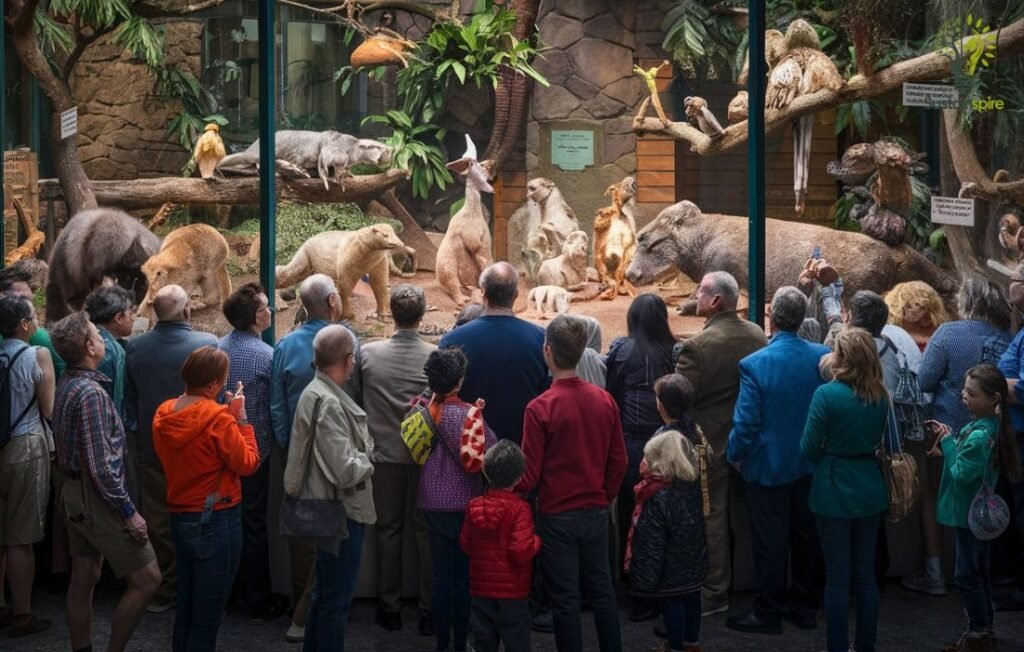
2. Conservation Efforts: Zoos Leading the Charge
Many zoos are actively involved in conservation efforts. These efforts are both local and global. They participate in breeding programs for endangered species. These programs help to increase population numbers and genetic diversity. Through these programs, zoos have played a crucial role in bringing species back from the brink of extinction. This is a powerful counterpoint to the question of Should zoos be banned? Zoos also conduct research on animal biology, ecology, and conservation strategies. This research provides valuable insights. These insights can be applied to protecting animals in their natural habitats.
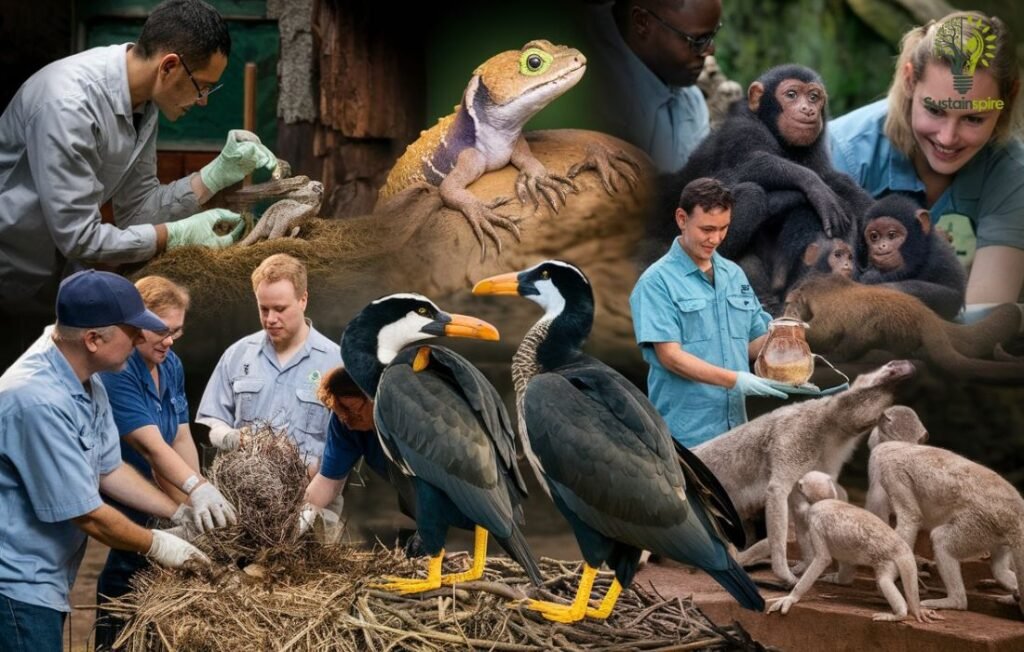
3. Research and Animal Care:
Behind the scenes, zoos are committed to providing high-quality care for their animals. Zoos employ veterinarians, nutritionists, and animal keepers. These experts work hard to make sure the animals are healthy and happy. These advancements raise an important question in the debate of weather Should Zoos Be Banned? Modern zoos make spacious and exciting enclosures that are similar to the animals’ natural homes. These efforts aim to give the animals a good life, which is a big improvement from the small cages of the past. We will continue to discuss zoos. It is important to recognize the positive impact they have on animal conservation and education.
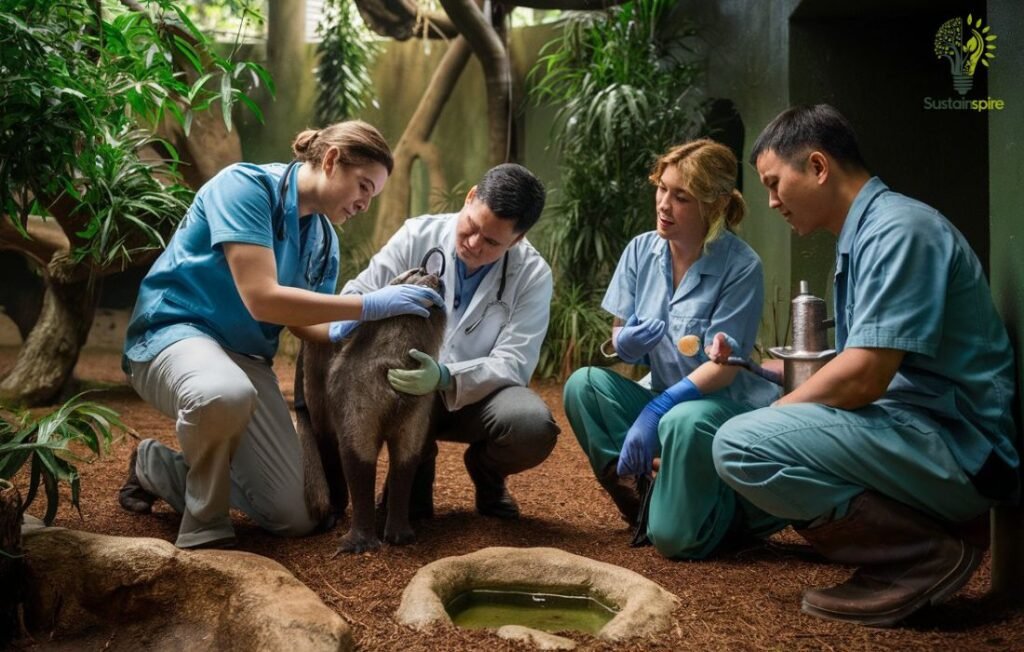
A Closer Look at the Issues: Examining The Ethics of Zoos
In this section, we will explore the concerns people have about zoos. We will also look at how zoos help protect animals and how they teach people about wildlife.
How Do Zoos Impact Animal Welfare?
Modern zoos often try to create good living spaces for animals. Yet, the debate surrounding Should zoos be banned persists. However, keeping wild animals in captivity raises ethical concerns. Zoos have become a common form of entertainment. But we must examine the impact of confinement on animals.
1. The Effects of Confinement: Should Zoos Be Banned?
Wild animals in zoos are kept in spaces that are large by some standards. However, these spaces cannot recreate the vast natural habitats where these animals evolved to live. This confinement can lead to physical and mental problems for the animals. This raises concerns about animal welfare, prompting the question: Should Zoos Be Banned? We see pacing, swaying, and biting bars as common behaviors in these animals. These behaviors show that they are stressed and bored. Zoos often keep animals that are not endangered or facing immediate threats in the wild. This makes us wonder if they really need to be kept in these spaces.
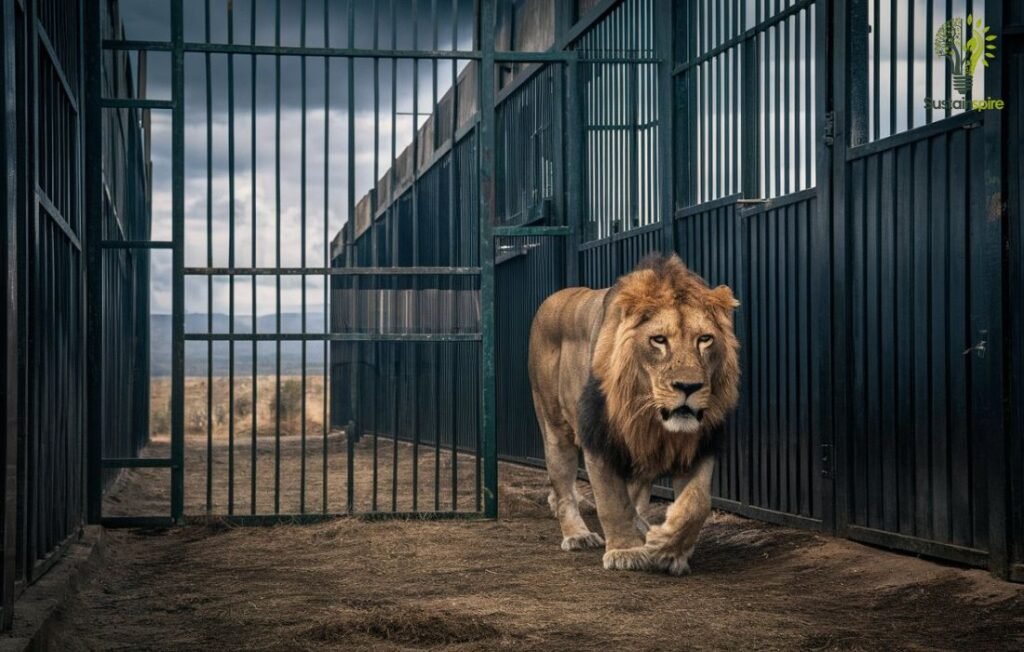
2. Unethical Activities:
Unfortunately, a lack of transparency and accountability affects some zoological facilities. These facilities don’t always have proper record-keeping practices for animals. This means they might not always track information like animal origins, deaths, or transfers. This lack of transparency fuels the debate surrounding Should Zoos Be Banned. This is disturbing because some zoo owners sell animals to circuses and private collectors. They might even have them killed when the animals become inconvenient or expensive to maintain. These practices are against the conservation message that many zoos try to promote.
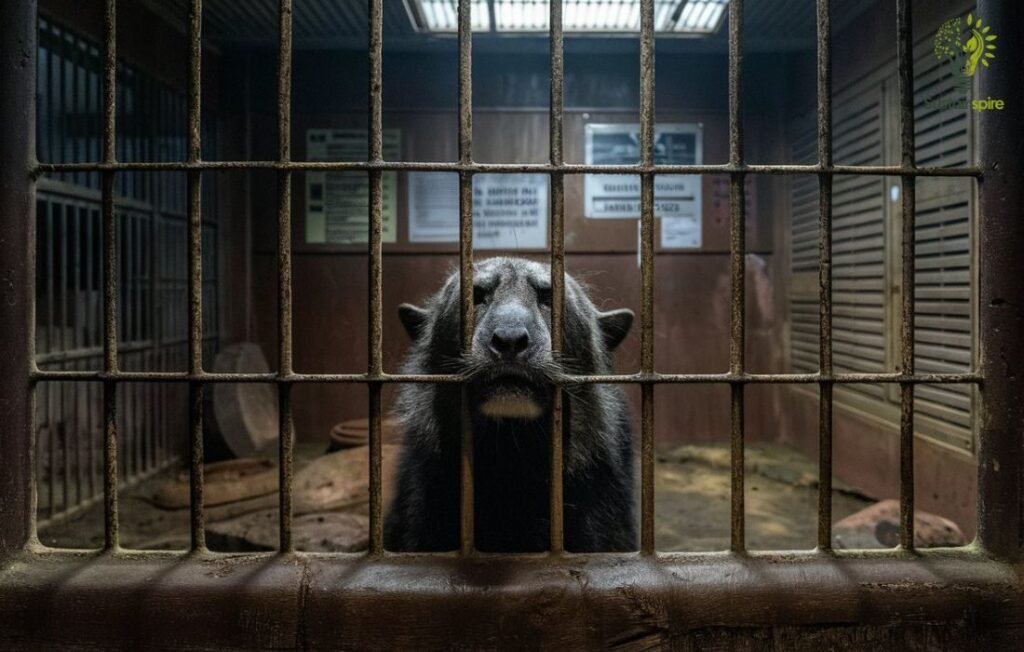
3. Stereotypic Behaviors:
It is common for captive animals to show signs of stress. These signs can look like repetitive actions that do not seem to have a purpose. We call these actions “stereotypic behaviors.” For example, a study by Clubb and Mason in 2003 found that polar bears in zoos paced more than polar bears in the wild. These behaviors serve as a window into the potential downsides of captivity, prompting the question: Should Zoos Be Banned? It can be very stressful for animals to be around large crowds, loud noises, and in places that are not their natural home. This stress can lead to long-term health problems and make the animal feel bad.

4. Captive Breeding Programs:
Captive breeding programs are often called a conservation success story. These programs can be helpful, but they also have ethical concerns. However, the question of Should Zoos Be Banned remains a pressing one. It is often hard to return animals that were raised in captivity back to the wild. Animals raised in captivity may not have the skills they need to survive. They may have trouble dealing with the threats that are in their natural home.

The Role of Zoos in Conservation:
Many zoos play a critical role in protecting wildlife. They breed endangered animals and study their behavior & biology. They also try to educate the public about conservation. But do these efforts go far enough to justify keeping animals in captivity? Let’s take a closer look.
1. Protecting Endangered Species:
Zoos are playing a crucial role in the fight against extinction. They are using careful breeding programs to help endangered animals. These programs match compatible animals to keep their genes diverse. Species Survival Plans (SSPs) are an example of these efforts. You can read more about SSPs in an article by SustainSpire, linked here. SSPs are carefully designed to help endangered species survive outside their natural homes.
However, the debate surrounding Should zoos be banned continues despite success stories. We will provide an example of how zoos are helping endangered species. In 1982, there were only 22 California condors left in the wild. Thanks to the efforts of zoos like the San Diego Zoo and the Los Angeles Zoo. The California Condor Recovery Program successfully introduced captive-bred condors back into the wild. Today, there are over 500 California condors, with more than half living in the wild.

2. Reintroduction Programs:
Zoos also play a vital role in reintroduction programs. These programs give critically endangered animals a second chance in the wild. These are not your everyday house pets, we are talking about animals on the brink! Zoos help restore wild populations. Zoos carefully prepare animals for life in their natural habitats. They also select suitable environments.
The golden lion tamarin is an inspiring example of conservation success. In the 1970s, the golden lion tamarin was on the brink of extinction due to habitat destruction. Only a few hundred individuals remained in the Brazilian Atlantic However, the question of Should Zoos Be Banned becomes more nuanced when we consider success stories like this. Forest. Zoos around the world worked together to create a successful breeding program. This, along with reforestation efforts, allowed for the reintroduction of golden lion tamarins into the wild. It is a true comeback story!

3. Funding and Public Awareness:
Zoos do much more than just work behind the scenes. They actively fund and support conservation projects around the world. Zoos connect with millions of visitors each year. They raise awareness about endangered species and encourage people to take action. Reading about an endangered animal is one thing, but seeing it up close creates a whole new level of empathy.
However, the question of Should Zoos Be Banned persists even with these contributions. Many zoos allocate a portion of their revenue to support researchers and conservationists working in the field. They also engage in educational outreach programs. These programs educate the public about conservation challenges and solutions. They might not wear capes, but zoos are playing a vital role in protecting our planet’s biodiversity.
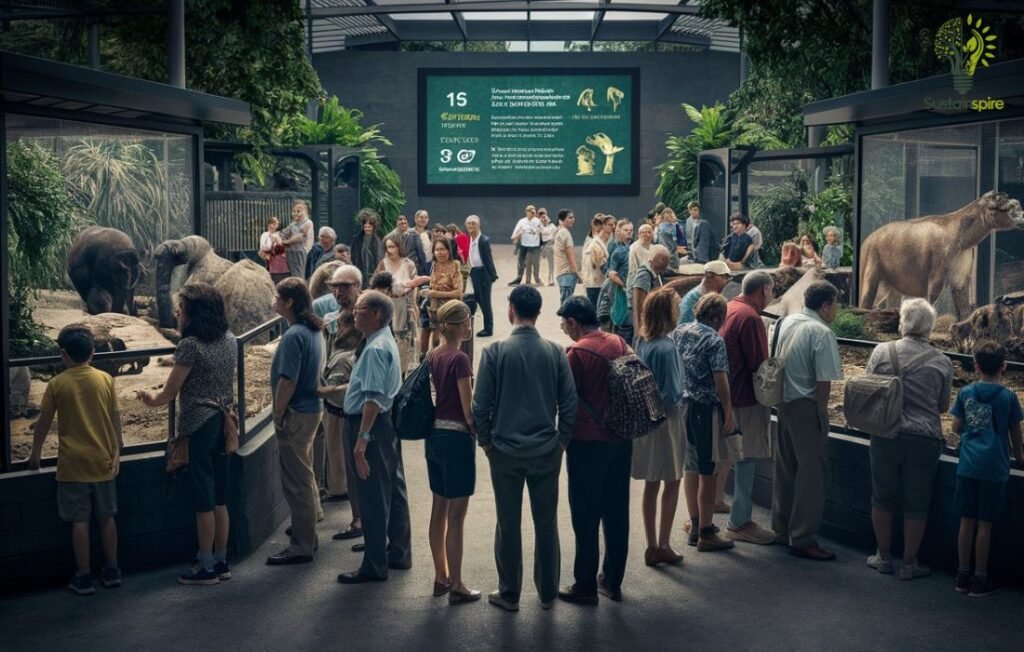
The Educational Impact of Zoos:
Zoos often present themselves as places of education. They provide information about different species, their habitats, and the threats they face. Here, the question regarding Should Zoos Be Banned becomes one of effectiveness. But how effective is this education, really? Let us explore about it.
1. Fostering Appreciation for Wildlife:
Zoo supporters believe that seeing animals up close can make people appreciate wildlife. They argue that this experience can inspire people to protect animals in the wild. A child who sees a lion or a penguin might be more likely to care about protecting them in their natural habitats.
The question of Should Zoos Be Banned finds renewed traction when considering the limitations of captivity. Some people argue that zoos cannot recreate the feeling of seeing animals in their natural habitat. They ask a valid question. Does a caged lion evoke the same respect and desire for conservation as seeing one roam free in the African savanna? This is the main point of the debate.
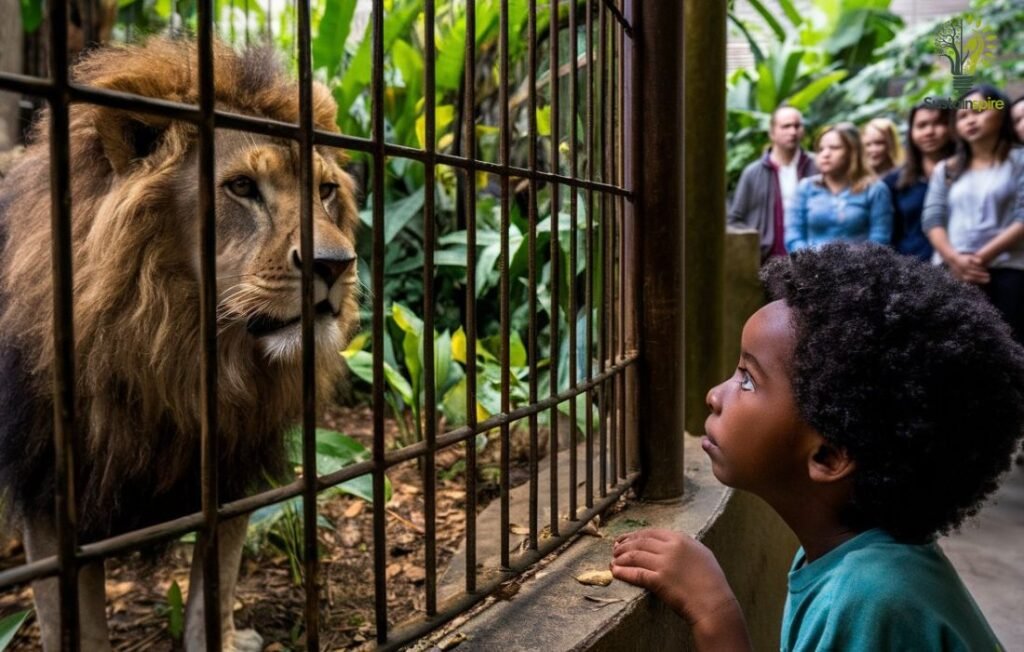
2. Connecting People to Nature:
Zoos try to help people learn about animals, especially those who cannot see them in the wild. They give us a look into the animal kingdom, hoping to make us understand and care about animals.
However, the question of Should Zoos Be Banned arises when considering the visitor experience itself. Sometimes people do bad things to animals at zoos. They might bang on glass or throw things, which makes the animals scared. This makes us wonder if we are really connecting with nature or if we are just seeing animals as entertainment. This is a big question in the discussion about zoos.
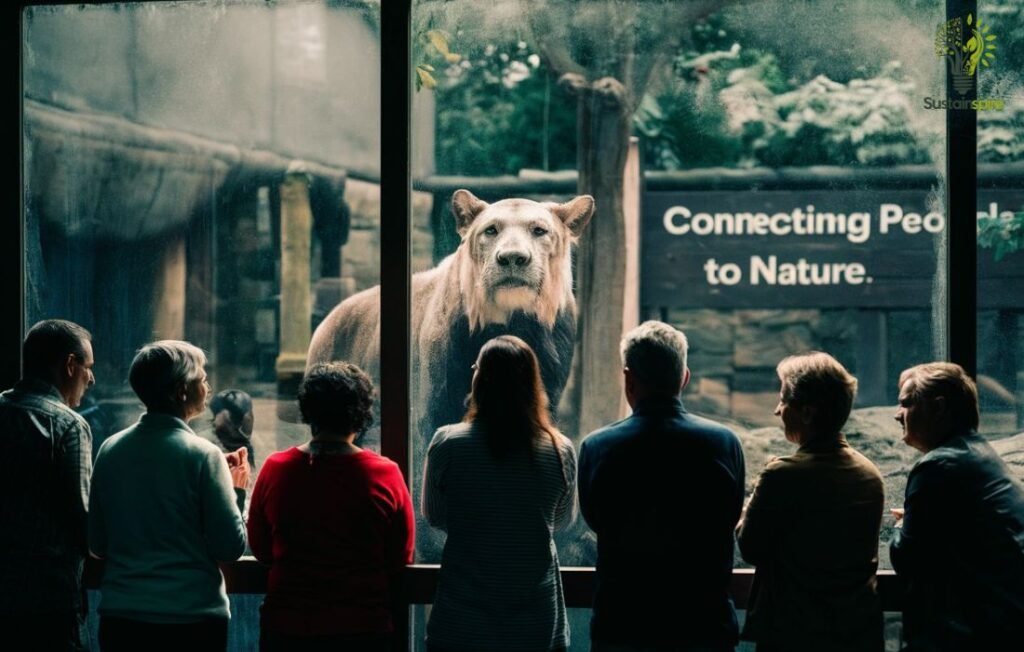
Considering Alternatives and the Future of Zoos:
For many people, the ethics of keeping wild animals in captivity raises serious questions. This has sparked an important discussion: What does the future hold for zoos? Can we find solutions that benefit both animals and humans? Let’s explore some alternatives and consider how zoos might evolve.
Exploring Alternatives to Traditional Zoos:
Traditional zoos, with their cages and enclosures, maybe a thing of the past. A growing movement is advocating for more ethical and humane ways to appreciate and protect wildlife. Should Zoos Be Banned? Perhaps not entirely, but a shift towards alternative models is gaining momentum. In this section, we will examine these promising alternatives, from spacious sanctuaries to immersive virtual experiences.
1. Sanctuaries and Wildlife Reserves:
Sanctuaries and wildlife reserves offer a kind alternative to zoos. These places focus on helping animals that have been hurt, lost their parents, or had to leave their homes. Unlike zoos, their main goal is not to entertain people. Instead, sanctuaries and reserves try to create a safe and natural place where animals can live their lives with respect.
One notable example is the Elephant Nature Park in Thailand. This sanctuary rescues elephants from harsh conditions like logging and tourism. At the park, elephants roam freely, socialize with one another, and receive specialized care. This is a great example of ethical animal care. The success of sanctuaries like this one throws the question of Should Zoos Be Banned into sharp relief. Sanctuaries often play a crucial role in protecting endangered species. They help with conservation efforts and educate the public about protecting wildlife.
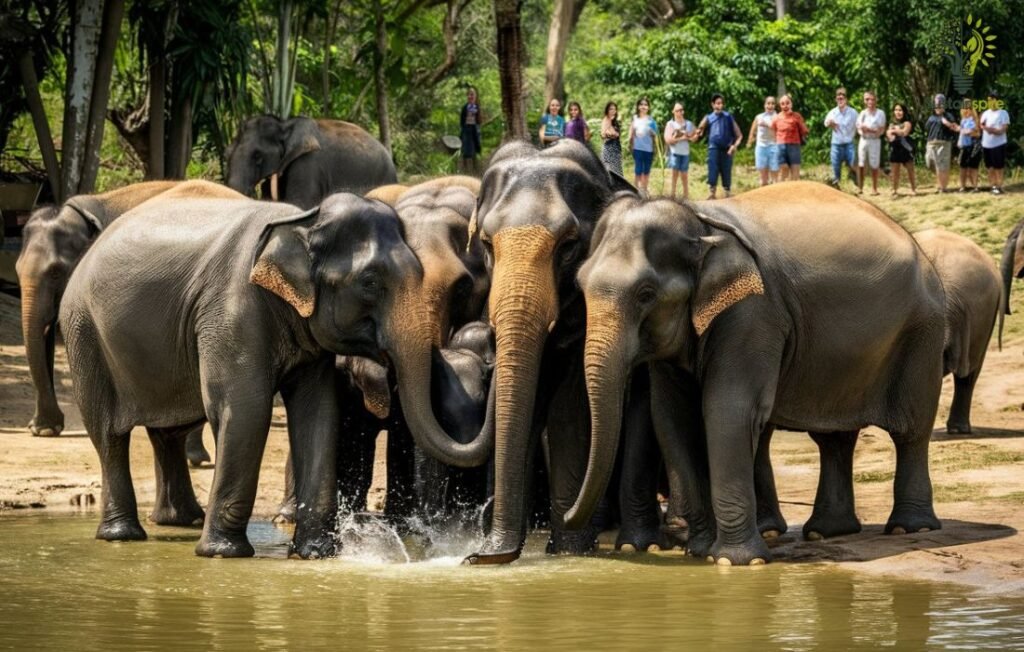
2. Virtual Zoos and Immersive Experiences:
Imagine experiencing the wonders of the Serengeti or the Amazon rainforest from the comfort of your home. Virtual zoos and immersive experiences are making this a reality. People can interact with realistic 3D models of animals and their habitats. They can do it through cutting-edge technology. You can learn about different animals and their habitat without leaving your house. These virtual experiences can be a fun and educational way to connect with nature.
This not only provides entertainment and education. But it also eliminates the need for physical confinement. This shift towards virtual experiences raises an interesting question in the debate of Should Zoos Be Banned? Museums, zoos, and educational institutions are increasingly incorporating virtual reality into their exhibits. For instance, the San Diego Zoo offers a remarkable virtual reality experience. That transports visitors to the African savanna to interact with elephants.

3. Eco-Tourism and Responsible Wildlife Viewing:
Eco-tourism and responsible wildlife viewing offer an opportunity to observe animals behaving naturally. They allow you to see animals in their undisturbed environments. These practices encourage respectful observation in the wild. Instead of confining animals to artificial enclosures, you can watch them in their natural homes. Try to choose an ethical tour guide who is committed to sustainability.
By choosing ethical tour operators, travelers can be a part of conservation efforts. You will enjoy unforgettable wildlife encounters. We will help you find guided tours led by knowledgeable naturalists. Guided tours led by knowledgeable naturalists can provide insights into animal behavior. These tours can also provide information about ecology and the importance of conservation. These experiences foster a deeper appreciation for wildlife and the need to protect their habitats.
Examples of these experiences could be tracking gorillas in Uganda. You can also observe whales migrating off the coast of Alaska. Another example would be witnessing the great migration in the Serengeti. Responsible wildlife viewing allows us to connect with nature on its own terms. This focus on responsible interaction with wildlife in their natural habitat reignites the question: Should Zoos Be Banned? We can help you learn about animal behavior, ecology, and the importance of conservation. You can also learn about the need to protect wildlife habitats. Let us help you connect with nature.
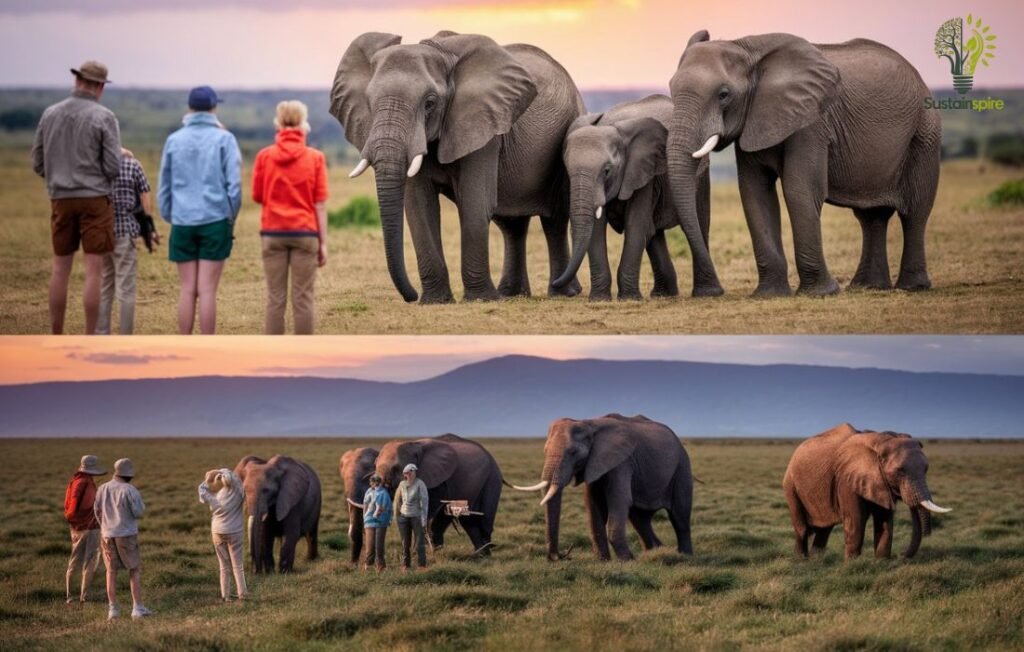
The Future of Zoos:
The debate about zoos is not about ending them, but about changing them. We want zoos to shift from entertainment venues to centers for conservation, education, and animal welfare. This change requires a focus on animal care, public engagement, and ethical guidelines. Here we will explore how zoos are working to meet these standards and should zoos be banned or not.
1. Focusing on Conservation:
Modern zoos are focused on becoming active participants in conservation efforts. As they are facing questions should zoos be banned? In the meantime, many zoos are strengthening partnerships with conservation organizations. They are supporting in-situ projects, which means protecting animals in their natural habitats.
Zoos are contributing to vital research initiatives. They are studying animal behavior, reproduction, and disease prevention to benefit animal populations in the wild. Zoos play a crucial role in protecting endangered species. They manage breeding programs to maintain genetic diversity.
Ethical zoos prioritize improving animal welfare standards. They provide larger, more naturalistic habitats. These habitats cater to the animals’ physical and psychological needs. Enrichment programs are becoming more sophisticated. They encourage natural behaviors and stimulate the animals physically and mentally.

2. Transparency and Education:
Modern zoos have a responsibility to be open and honest with the public about how they care for animals. They should acknowledge past mistakes and create clear plans for improvement. Independent oversight boards can help ensure zoos are accountable and maintain public trust. These boards monitor animal welfare and address public concerns. Should zoos be banned? This question can be addressed by focusing on zoos’ commitment to transparency.
The Association of Zoos and Aquariums (AZA) plays a vital role in setting standards for zoos. AZA has a strict process to check that zoos are doing a good job. This includes caring for animals and helping save them from going extinct. Zoos with AZA accreditation are committed to continuous improvement. Zoos can build a future where their existence aligns with the well-being of animals and the planet. This is possible by embracing transparency, prioritizing conservation, and offering meaningful educational experiences.
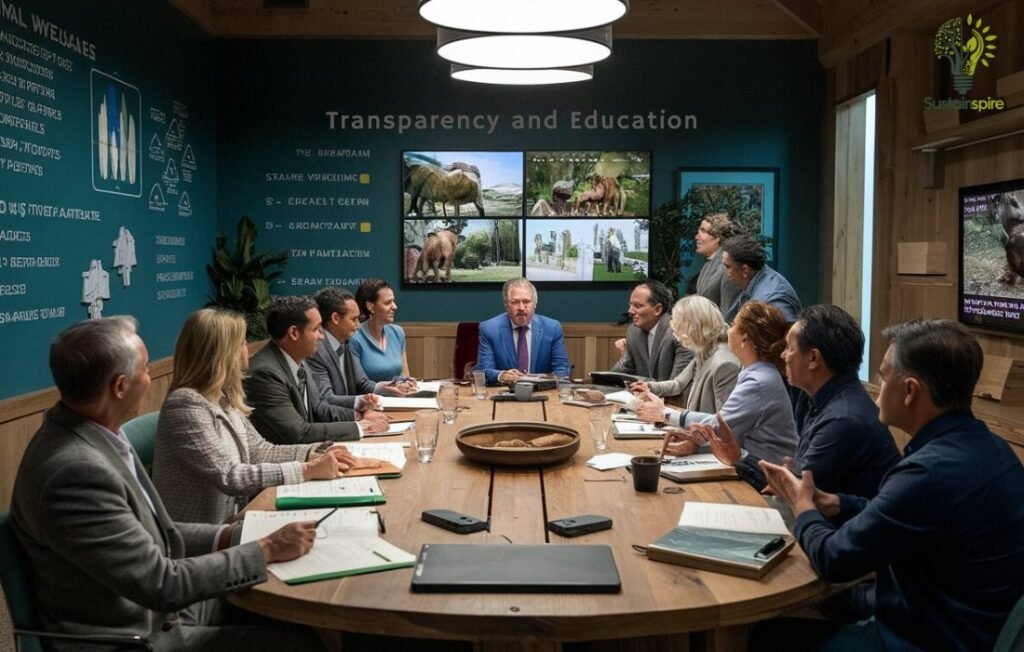
Conclusion:
In this article, we explored the heated ethical debate surrounding zoos: should zoos be banned? We looked at arguments for and against keeping animals in captivity. We examined the impact on animal welfare, the role of zoos in conservation, and their educational impact. Some people believe that zoos are cruel and unnecessary. Others believe that zoos play a crucial role in protecting endangered species and educating the public.
Zoos have changed a lot from having small cages and mistreating animals. Many zoos now focus on protecting animals, teaching people, and making sure animals are well cared for. But, some people still worry about keeping wild animals in zoos. It is important to keep checking how zoos are run and make improvements. So we can make sure that animals are well cared for and we can keep working to save endangered animals.
We encourage you to share your thoughts on this complex issue. In my opinion, zoos should not be banned. However, transparency, animal welfare, and the idea of a sanctuary are important. We cannot leave the planet’s valuable animals in the hands of businesses that only care about making money and are cruel to animals. What are your thoughts on the future of zoos? Do you think zoos can change to become places that are truly safe for animals and encourage people to protect nature? Share your thoughts and keep talking about this important issue!
FAQs
No, not all zoos are bad for animals, but some have better standards than others.
Zoos aim to educate and entertain visitors. While Sanctuaries primarily focus on rescuing and rehabilitating animals.
You can support ethical animal conservation by donating to reputable organizations. You can also help by volunteering and visiting zoos with strong animal welfare policies.
Before visiting a zoo, inquire about their animal welfare standards. You can also ask about their conservation efforts and enrichment programs.






